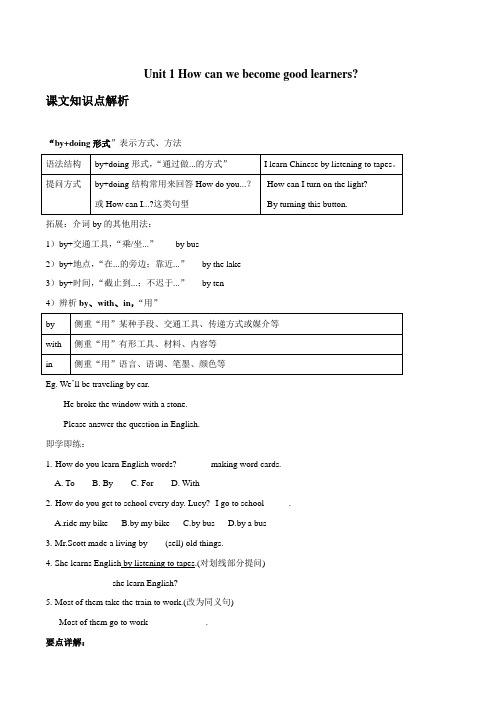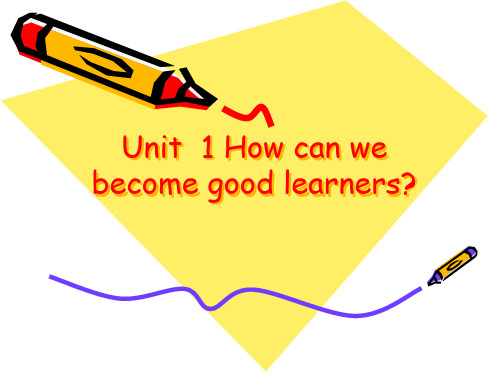英语人教版九年级全册UNIT1 Reading
人教版英语九年级全册Unit1 SectionA(3a-3b)名师教案

Unit1 SectionA〔3a-3c〕名师教案【教材版本与册数】新目标人教版九年级全一册【单元名称】Unit 1 How can we become good learners?【课时】Section A (3a-3b)〔第2课时〕【课型】Reading(阅读课〕【本课时教学设计】教材版本:新目标册数:第5册年级:九年级单元:Unit1 课型(课时):Section A 3a—3b 阅读课教材分析【本单元话题】围绕学习本身,讲述了学习的障碍及对应的解决方法,对学生有重要意义。
【本单元重点掌握目标】用“by + 动词-ing形式〞构造来表达方式方法。
【教材内容分析】阅读语篇在训练、开展学生阅读水平的同时,能帮助学生意识到提高学习兴趣和改良学习方法的重要性。
活动3A提出三个问题,帮助学生掌握文章主要内容;活动3b将两篇内容和本单元的重点语言构造“by +动词-ing 形式〞结合,对作者使用的英语学习的方法进展梳理。
【综合技能】通过阅读课文,培养好的学习方法,养成良好的学习习惯。
教学目标语言知识目标:1. Talk about how to study. 学会讨论各种学习方法2. Find out your suitable learning methods. 找出适合自己的学习方法。
3. 熟练掌握以下词汇:expression discover secret grammar4. 熟练掌握以下短语:look up connect…with… pay attention to fall in love the secret to…5. 掌握以下句型:How do you study English?I learn by working with a group.Do you learn English by reading aloud?How can I improve my pronunciation?情感态度价值观目标:1. 通过对学习方法的学习,培养学生用正确而科学的方法做事的能力,明白“一份耕耘,一份收获〞。
人教版英语九年级全册Unit1-6 Section A reading 2b 部份原文及翻译

Unit 1 How can we become good learners?Section A2b課文原文:How Can You Become a Successful learner?Everyone is born with the ability to learn. But whether or not you can do this well depends on your learning habits. Research shows that successful learners have some good habits in common.如何成为一个成功的学习者?每个人都生来就有学习的能力。
但是,你能否做好这个取决于你的学习习惯。
研究表明,成功的学习者有一些共同的好习惯。
Creating an interest in what they learn对所学的東西创造兴趣Studies show that if you are interested in something, your brain is more active and it is also easier for you to pay attention to it for a long time. Good learners often connect what they need to learn with something they are interested in. For example, if they need to learn English and they like music or sports, they can listen to English songs or watch sports programs in English. This way they will not get bored.研究表明,如果你对某事感兴趣,你的大脑会更加活跃,而且你更容易长时间地关注它。
新目标人教版九年级英语上册Unit1全单元知识点归纳

Unit 1 How can we become good learners?课文知识点解析“by+doing 形式”表示方式、方法拓展:介词by 的其他用法:1)by+交通工具,“乘/坐...” by bus2)by+地点,“在...的旁边;靠近...” by the lake3)by+时间,“截止到...;不迟于...” by ten4)辨析by 、with 、in ,“用”Eg. We ’ll be traveling by car.He broke the window with a stone.Please answer the question in English.即学即练:1.-How do you learn English words? -_____making word cards.A. ToB. ByC. ForD. With2.-How do you get to school every day. Lucy? -I go to school _____.A.ride my bikeB.by my bikeC.by busD.by a bus3. Mr.Scott made a living by____(sell) old things.4. She learns English by listening to tapes.(对划线部分提问)_____ ______ she learn English?5. Most of them take the train to work.(改为同义句)Most of them go to work ______ ______.要点详解:Section A1.by asking the teacher for help通过向老师求助。
(P1)1)by,“通过;靠”,后加名词/代词/动名词。
Eg. He had to do all the work by hand.2)ask (sb)for sth,“向某人要某物;要求某人某事”。
人教版英语九年级全册Unit1 单元目标解读

Unit1 单元目标解读【单元名称】新目标人教版九年级全一册Unit1 How can we become good learners?【单元话题】学会学习〔Learning how to learn〕【教材内容】本单元围绕课余活动设计不同层次的语言实践活动,教会学生谈论从事不同活动的频率。
一、词汇和常用表达1. 通过课前自主预习和图片观察,能够认读和使用以下词汇和相关话题的常用表达。
textbook, conversation, pronunciation, sentence, expression, secret, grammar, note, physics, chemistry, speed, partner, ability, brain, attention, knowledge, discover, repeat, pronounce, increase connect, review, active, aloud, wisely , fall in love with , pay attention to, connect…with, pal, memorize, pattern, overnight, lifelong本单元对学习方式的讨论,以及对“by+doing〞的学习及练习,学生能正确使用目标句型谈论自己及他人的学习方式。
How do you learn English?I learn by studying with a group.Do you learn English by reading aloud?Yes, I do. It helps my pronunciation.How can I read faster?You can read faster by reading word groups.How can I improve my pronunciation?One way is by listening to tapes.二、学习能力3.通过情景句的呈现和学生在情景中的意义操练,学生能正确对学习方式进展讨论和评价,展开较为真实的交谈和讨论。
人教版九年级英语全一册unit1课文讲解(智能版推荐)

[dɪˈskʌvə(r)] v. 发现,发觉
[ˈsi:krət] n. 秘密,秘诀 adj. 秘密的,保密的
keep a secret 保守秘密
I did not understand these sentences at first. But because I wanted to understand the story, I looked them up in a dictionary.
Role-play the conversation
[ˌkɒnvəˈseɪʃn] n. 交谈,谈话 have conversations with sb
与某人谈话
Annie, I’m a little nervous. I have to finish reading a book and give a report next Monday.
Last year, I did not like my English class. Every class was like a bad dream. The teacher spoke so quickly that I did not understand her most of the time. I was afraid to ask questions because of my poor pronunciation. I just hide behind my textbook and never said anything.
That sounds difficult!
[ˈpeɪʃnt] adj. 有耐心的/n. 病人
be patient with sb 对某人有耐心
the+比较级, the+比较级 越…越…
人教版九年级英语Unit1reading词组

Unit 1 1.处理问题 2.变的不高兴 3.担心 4.写下 5感觉柔软. 6.编造\组成 7.生…气 8.时光流逝 9.丢失 10.与意见不一致 11.决定不做 12.解决问题 13.把..看作… 14.抱怨…
deal with the problems become unhappy worry about =be worried about write down feel soft make up be angry with Time goes by \Time flies be lost have disagreements with decide not to do sth. solve problems regard ..as.. complain about
think of think about face challenges break off a friendship
20.想起以为 21.考虑.思考 22.面对挑战 23.中断友谊
1.不公平 2.互相帮助 3.维持很长时间/两天 4.有太多作业要做 5.更糟的事 6.成功成名 7.咱们做…吧 8.咱们不做…吧 9.尽职尽责 10.把…与…unfair help each other last for long \ two days have lots of home work to do something worse be famous and successful Let’s do Let’s not do do one’s duty compare …to.. speak English as a second language
15.对…要求严格 16.把…转变为… 17.做…是我们的责任 18.尽力做… 19.在…的帮助下
人教版九年级全一册英语Unit1单元语法知识点总结
人教版九年级全一册英语Unit1单元语法知识点总结本单元重点短语的具体用法1. Good learners:优秀的学习者。
例如:Good learners always find ways to improve their study.(优秀的学习者总是找到方法来提高他们的学习。
)2. Work with friends:和朋友一起学习。
例如:It's better to work with friends to study.(和朋友一起学习会更好。
)3. Study for a test:备考。
例如:I need to study for the math test tomorrow.(我需要为明天的数学考试备考。
)4. Have conversations with:与……交谈。
例如:I like having conversations with my English teacher.(我喜欢和我的英语老师交谈。
)5. Speaking skills:口语技巧。
例如:Improving speaking skills requires a lot of practice.(提高口语技巧需要大量的练习。
)6. A little:有点儿。
例如:I'm a little tired today.(我今天有点儿累。
)7. At first:起初,起先。
例如:At first, I found it difficult to learn English.(起初,我发现学习英语很困难。
)8. The secret to...:……的秘诀。
例如:The secret to success is hard work.(成功的秘诀是努力工作。
)9. Because of:因为。
例如:Because of the rain, we had to cancel the picnic.(因为下雨,我们不得不取消野餐。
人教版新目标初中英语九年级全一册 知识点总结1单元
九年级Unit1How can we become good learners1.单元重点词汇1.textbook/ˈtekstbuk/n.教科书;课本关联用法:textbooks复数关联词组:by reading the textbook2.conversation/kɔnvəˈs eɪʃn/,n.交谈;谈话关联用法:conversations复数关联词组:make conversations编写对话have conversations with sb.=have a conversation with sb.与某人进行交谈3.aloud/əˈlaud/adv.大声地;出声地关联词组:read aloud大声读/出生读4.pronunciation/prənʌnsiˈeIʃn/n.发音;读音关联词组:practice pronunciation练习发音5.sentence/ˈsentəns/n.句子关联用法:sentences复数关联词组:by reading the sentence通过读教科书6.patient/ˈpeiʃnt/adj.有耐心的n.病人关联用法:patience名词:耐心;patients复数关联词组:impatient形容词:没有耐心的patiently副词:耐心地be patient with sb.对某人有耐心be patient of sth.对某事能容忍have(no)patience with…对…(没)有耐心lose patience with对…失去耐心out of patience没有耐心7.expression/ikˈspreʃn/n.表达(方式);表示关联用法:expressions复数关联词组:facial expressions面部表情8.discover/dIˈskʌvə(r)/v.发现;发觉关联用法:discovery名词:发现9.secret/ˈsi:krət/n.秘密;adj.秘密的;保密的关联用法:secrets复数关联词组:in secret秘密地;keep a secret保密;a secret plan秘密的计划10.look up(在词典,参考书中或通过电脑)查阅;抬头看11.fall in love with爱上;与⋯⋯相爱12.grammar/ˈgræmə(r)/n.语法关联词组:in grammar在语法方面13.repeat/riˈpi:t/v.重复;重做关联用法:secrets复数关联词组:repetition名词:重复14.note/nəut/n.笔记;记录v.注意;指出关联用法:notes复数关联词组:please note清注意;take notes记笔记15.pal/pæl/n.朋友;伙伴关联词组:pen pal笔友16.physics/ˈfiziks/n.物理;物理学关联单词:adj.物理的;身体的;物质的;根据自然规律的,符合自然法则的关联词组:Space Physics空间物理学物理空间空间物理17.chemistry/ˈkemistri/n.化学关联词组:Organic Chemistry有机化学18.memorize/ˈmeməˌraɪz/v记住;记忆关联单词:memory n.记忆关联用法:过去式memorized过去分词memorized现在分词memorizing第三人称单数memorizes典型例句:Have you memorized your lines for the play yet?你记住剧本中的台词了吗?19.pattern/ˈpætn/,/ˈpætən/n.模式;方式20.pronounce/prəˈnaʊns/v.发音关联用法:过去式pronounced过去分词pronounced现在分词pronouncing第三人称单数pronounces关联词组:Pronounce correctly发音正确正确发音典型例句:I can not pronounce correctly我不能正确发音21.increase/Inˈkri:s/v.增加;增长关联用法:过去式increased过去分词increased现在分词increasing复数increases第三人称单数increasesn.增加;增多;增长关联词组:increase by增加了;按…增长on the increase正在增加,正在增长22.speed/spi:d/n.速度v.加速关联单词:speeding超速关联用法:过去式sped或speeded过去分词sped或speeded现在分词speeding 关联词组:speed up加速加快速度使加速加快speed limit速度限制时速限制限速最高车速23.partner/ˈpa:(r)tnə(r)/n.搭档;同伴24.born/bɔːn/v.出生adj.天生的关联词组:be born with天生具有born yesterday乳臭未干典型例句:Swift was born in1667.斯威夫特生于1667年。
人教版九年级全一册unit 1 1a~2d课件
A.According B.by C.below
猜测单词by 的含义: I know the wordby looking up thedictionary.
1
2
通过1和2,可猜测by的含义: by:介词.通过…的方式.
知识巩固: 翻译下面的句子:
4.Sound听起来….. 后接形容词。和本词用法一致的还有:look、 feel、taste……. ( A )1. The red coat____beautiful.
A.looks B.feel C.sound
( B )2. Your idea_____good. A.look B.sounds C.sound
Unit1 How can we become good learners?
SectionA(1a~2d)
词汇过招:
textbook /ˈteksbʊk/ n.教科书;课本 conversation /kɒnvəˈseiʃn/ n.对话;谈话
aloud /əˈlaʊd/ adv. 大声地;出声地
sentence /ˈsentəns/ n.句子
11、越是没有本领的就越加自命不凡 。21.8.3 20:20:2 120:20 Aug-21 3-Aug-2 1 12、越是无能的人,越喜欢挑剔别人 的错儿 。20:20: 2120:2 0:2120: 20Tues day, August 03, 2021 13、知人者智,自知者明。胜人者有 力,自 胜者强 。21.8.3 21.8.32 0:20:21 20:20:2 1Augus t 3, 2021 14、意志坚强的人能把世界放在手中 像泥块 一样任 意揉捏 。2021 年8月3 日星期 二下午8 时20分 21秒20 :20:212 1.8.3 15、最具挑战性的挑战莫过于提升自 我。。2 021年8 月下午 8时20 分21.8.3 20:20A ugust 3, 2021 16、业余生活要有意义,不要越轨。2 021年8 月3日 星期二8 时20分 21秒20 :20:213 August 2021 17、一个人即使已登上顶峰,也仍要 自强不 息。下 午8时20 分21秒 下午8 时20分2 0:20:21 21.8.3
九年级上册英语Unit 1 Reading(1) 课时练习(含答案)
Unit 1 Know yourselfReading(1)一、根据首字母提示填空1. He often does good deeds, so his teacher often p________him.2. He failed in the exam again because of his c________.3. She is a b________teacher and she is very patient to her students.4. The Russians were the p________of space travel.5. Three fast runners entered the r________, but Jim beat them at last.二、选用方框内所给短语的正确形式填空1. We should try our best so that the work could be done______________.2. She_______________in the running race and won first prize.3. Don’t_____________your hope no matter what difficulties you have.4. People usually______________China____________silk and good food.5. You will______________the comfort and modern equipment provided inside the car.三、按照所给汉语,用英语完成下列句子1. Jack is a modest artist and never shows off, but________________________(他的作品具有说服力).2. Working day after day last year____________________(使我很不开心).3. Study hard, ________________(否则你会落后的).4. Be careful! You know________________(失之毫厘,谬以千里).5. -Let’s do exercise.-__________________(我完全赞同).四、单项选择( ) 1. I saw________Tom________Jack. There was nobody in the classroom atall.A. either, orB. not, butC. not only, but alsoD. neither, nor ( ) 2. Either you or I________going to Beijing next week. But both of us are not going there together.A. amB. areC. isD. was( ) 3. When you cross the street, you can’t be________careful.A. soB. quiteC. tooD. very( ) 4. Exploring outer space is a________to mankind because there are many unknown difficulties.A. jobB. challengeC. standardD. pioneer ( ) 5. She said that he________promised to buy a new car for her.A. as soon asB. as important asC. as fast asD. as good as五、首字母填空How can you get happiness? You may say that happiness requires nice comforts like a h____1____, a car, a big bank balance, a high paying job.Here in India where I live, I have t____2____through villages where people seemed to earn just enough to make ends meet. I have seen happiness there. I have seen s____3____faces and smiling eyes that readily gave me directions. They were very f____4____and made my journey easier.I have also worked for 3 years on Wall Street, in a big investment bank. I have seen some people with a lot of m____5____but still unhappy. I am not saying that all rich are unhappy(or the poor, happy). But the fact that there a____6____some rich people who look angry or listless and there are some poor people who l____7____happy, points out that there must be something else to h____8____, than just money, luxury and comfort.Happiness, it seems, is not a factor of how much you have. You can feel happy l____9____to a good song, you can feel happy watching a beautiful sunrise, and you can feel happy in any number of ways that don’t require any possessions at a____10____.1. ________2. ________3. ________4. ________5. ________6. ________7. ________8. ________9. ________ 10. ________答案一、1. praises 2. carelessness 3. born 4. pioneers 5. race二、1. to high standards 2. took the lead 3. give up4. connect, with5. be impressed with三、1. his work shouts 2. made me very unhappy3. or/otherwise you will fall behind4. a miss is as good as a mile5. I can’t agree more四、1-5 DACBD五、1. house 2. travelled 3. smiling 4. friendly5. money6. are7. look8. happiness9. listening 10. all。
- 1、下载文档前请自行甄别文档内容的完整性,平台不提供额外的编辑、内容补充、找答案等附加服务。
- 2、"仅部分预览"的文档,不可在线预览部分如存在完整性等问题,可反馈申请退款(可完整预览的文档不适用该条件!)。
- 3、如文档侵犯您的权益,请联系客服反馈,我们会尽快为您处理(人工客服工作时间:9:00-18:30)。
Asking questions Good learners often ask questions during or after class. They even ask each other and try to find out the answers. Knowledge comes from questioning. Learning is a lifelong journey because every day brings something new. Everything that you learn becomes a part of you and changes you, so learn wisቤተ መጻሕፍቲ ባይዱly and learn well.
overnight adv. 一夜之间
Developing their study skills It is not enough to just study hard. Good learners know the best way they can study. For example, they may take notes by writing down key words or by drawing mind maps. They also look for ways to review what they have learned. They may do this by reading their notes every day or by explaining the information to another student.
教学目标
•
认知目标:
•
1. Talk about how to study. 学会讨论各种学
习方法和策略。
•
2. Find out your suitable learning methods.
找出适合自己的学习方法。
•
3.阅读策略:使用词典.
•
情感目标:
•
通过对学习方法的学习,培养学生用正确而科学
ability n. 能力,多为不可数名词,其后通常要接不 定式。 born v. 出生 adj. 天生的 be born with 天生具有
Creating an interest in what they learn Studies show that if you are interested in something,
Reading
2b Read the passage quickly. Underline the four habits of successful learners are mentioned.
How Can You Become a Successful Learner? Everyone is born with the ability to learn. But whether or not you can do this well depends on your learning habits. Research shows that successful learners have some good habits in common.
knowledge n. 知识,学问 lifelong adj. 终身的,毕生的 wisely adv. 明智地,聪明地
your brain is more active and it is also easier for you to pay attention to it for a long time. Good learners often connect what they need to learn with something interesting. For example, if they need to learn English and they like music or sports, they can listen to English songs or watch sports programs in English. This way they will not get bored.
create v. 创造,创建 brain n. 大脑 active adj. 活跃的 pay attention to 注意;关注 connect…with… 把…和…连接或联系起来
Practicing and learning from mistakes
Good learners think about what they are good at and what they need to practice more. Remember, “Use it or lose it"! Even if you learn something well, you will forget it unless you use it. “Practice makes perfect.” Good learners will keep practicing what they have learned, and they are not afraid of making mistakes. Alexander Graham Bell did not invent the telephone overnight. He succeeded by trying many times and learning from his mistakes.
的方法做事的能力,明白“一份耕耘,一份收获”。
•
技能目标:
• 熟练掌握文章中:词汇,短语,句型
Discussion
2a What good learning habits can you think of? Make a list and discuss them with your partner. n. 搭档;同伴
